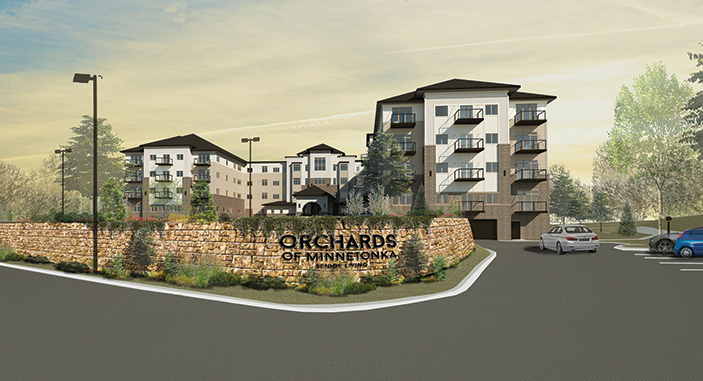By Liz Wolf
Senior housing developments are popping up around the Twin Cities metro area in anticipation of Minnesota’s so-called “silver tsunami” – the massive wave of baby boomers entering their golden years. The state of Minnesota has 1.5 million baby boomers.
Currently, 2,018 new senior housing units are recently completed or under construction and projected to open by year-end 2018, and another 2,470 units are projected to come on line in 2019, according to Jay Thompson, president of Viewpoint Consulting Group Inc., who tracks senior housing development. That projected 2019 number is based on developments that have broken ground in 2018 and are anticipated to break ground this year.
The need for senior housing is massive. According to the Metropolitan Council, by 2040, one in every five residents of the Twin Cities region will be age 65 or older. The 65 and over population is the state’s fastest-growing age group. Even more eye-opening is the Twin Cities region’s senior population will more than double, growing from 307,000 in 2010 to 797,000 in 2040 as baby boomers continue to age and life expectancies increase. By 2040, seniors will make up 21 percent of the region’s population.
Senior housing is a big industry
Nationally, senior housing is estimated to be a $250 billion to $270 billion industry. (There are 75 million baby boomers in the United States with 10,000 of them turning 65 every day).
Locally, “There’s a lot of inventory coming on the market to meet the future demands,” says Sharon Thole, director of Love Funding, one of the nation’s leading providers of FHA multifamily, affordable and healthcare financing. “The biggest development has been of assisted-living facilities, memory care and independent living,” says Thole, a licensed nursing home administrator, who has worked as an operator in Minnesota and the Upper Midwest for the past 17 years. She joined Love Funding in April.
Thompson says the market needs more housing catering to active seniors.
“The greatest need is for buildings that cater to younger, more active seniors who don’t need the level of assistance found in assisted-living buildings,” he says. “Recent development has disproportionately been housing with services, which primarily caters to seniors in the mid-80s and over. At the same time, the fastest-growing segment of the senior population is those in their 70s.”
More private equity, developers enter market
Thole says private equity and developers have entered the market moving from multifamily development to senior housing to meet the demand and in hopes of “reaping some nice investment returns. They see there’s a demand and want to be in front of it,” she says.
“I think there’s still some room in the market for more affordable senior housing to be built,” Thole points out. “Most of the inventory that has come on the market is market rate or luxury. I believe there are variances among baby boomers’ income levels, and there‘s a large portion that will fall into needing affordable housing when this all washes out.”
Thole also says investors and development groups are relying on local operators to run the operations.
“The biggest challenge for the operators is to hold occupancy steady while the wave of seniors enter the market,” she says. Also challenging is “figuring out how to offer services that meet the meet baby boomers’ expectations at price points the baby boomers are willing to pay for.”
Thole says, “By 2030, when all the baby boomers reach 65, we will know if we have enough inventory to meet the demand.”
Are we heading in the right direction?
“I think we’re on track,” says Susan Farr, vice president of new business development for Ebenezer, the Twin Cities largest senior living operator. Ebenezer, which is part of Fairview Health Services, has 90 owned and managed communities in operation or under construction, and more in the works.
“I’m working on stuff up to 2021 right now,” Farr says, pointing to new projects underway in Minnetonka and Chanhassen, among others.
Ebenezer partners with big developers including The Opus Group, Oppidan Investment Co. and United Properties as well as smaller developers to manage and operate their facilities.
Farr says “demand is just exploding,” however, Ebenezer is very selective in who they work with.
“We set the bar high,” she says. “It’s very different than developing a market-rate apartment building. Market rate is a real estate deal. Senior housing is an operator deal. It’s operator-driven.”
Ebenezer’s facilities provide the full continuum of care including independent living, assisted living, memory care, transitional care, adult day programs, child care and intergenerational programs.
“Are we excited that this industry is booming? Absolutely we are,” Farr says. “It’s exciting times.”
Oppidan recognizes demand
Seeing the booming demand, Excelsior-based Oppidan is partnering with Ebenezer Management Services on its senior housing projects.
“The sense is that the demand is really just beginning,” says Shannon Rusk, vice president of development at Oppidan. “They call it the ‘silver tsunami.’ It really starts in 2020, and statistically, if you look at all the trends and demographics, it continues to grow to 2050. There’s really no end in sight.
“We’re not concerned about the demand being there,” she adds. “What we’re concerned about is making sure we’re building in the right locations, not overbuilding, not building too close to where our competitors’ communities are, and that we’re understanding the specific demographics where we’re building and providing the right community with the right amenities and the right type of apartments and finishes. That’s where we work closely with Ebenezer. They know what works and what doesn’t work.”
Oppidan currently has two senior housing facilities under construction — in Mankato and Minneapolis. The Minneapolis development is the $85 million, 283-unit project called The Pillars of Prospect Park, which broke ground in July and will be completed in 2020. It’s located in the Prospect Park neighborhood of Minneapolis, near the University of Minnesota campus. It will feature underground parking, retail space and a child care center. The facility will be “intergenerational,” meaning it will foster interaction between older adults and kids. The daycare center will also help the University of Minnesota fill a gap in childcare shortages while employing students. (The university announced plans to close its childcare center).
“We came upon this opportunity, which in our mind was a perfect blend of not only being part of the University of Minnesota but we’re in Prospect Park, which is very residential,” Rusk says. “That’s where a lot of the professors and staff and medical professionals who work at the university live, and it turns out that there’s a very mature demographic in Prospect Park.”
Rusk says the proximity to the university offers opportunities for collaboration with university staff and students. The site is also near the light rail transit station to help draw employees from around the Twin Cities.
The facility will offer independent-living, assisted-living and memory-care options. Amenities will include a theater, fitness center, chapel, bistro, roof deck and golf simulator.
The Opus Group making its entrance into senior housing
Leveraging its strong residential expertise, Opus is developing the 147-unit senior living development in Minnetonka called the Orchards of Minnetonka, which will provide a full continuum of care including independent living, assisted living and memory care. Opus is partnering with Ebenezer to manage the facility. Amenities will include a salon, chapel, club room, community room and memory care garden.
“We are pleased to expand our collaborative business model into senior living through this shared effort with Ebenezer,” said Matt Rauenhorst, vice president, Opus Development Co. L.L.C., in a prepared release. “The market demand coupled with our vision for this site and Ebenezer’s strong track record managing these properties is a recipe for success.”
The project is scheduled for completion in April 2019.
United Properties is developing senior co-ops, assisted-living communities
Minneapolis-based United Properties is very active in the senior-living sector with Applewood Pointe senior co-op communities under construction in Eagan, Champlin and Maple Grove and move-ins occurring in Roseville. They facilities are managed by Ebenezer.
The developer is also building assisted-living communities, in partnership with Ebenezer, and recently opened Cherrywood Pointe projects in Minnetonka and Plymouth.
Dominium focuses on affordable senior housing
“We’ve always had a presence in the affordable senior housing market, but we really saw demand coming and started doing new construction to address the need in 2013,” says Ron Mehl, vice president and project partner at Plymouth-based Dominium. “Between 2013 and today, we’ve built or are in the process of building over 2,000 units.”
Dominium has about a half-dozen affordable, independent senior communities that recently opened or are under construction with more planned. Mehl believes it’s going to be difficult to keep up with increasing demand.
“I think the need is going to outpace the production,” he says. “Thirty percent of people over age 65 in Minnesota live solely on social security. We’re in this affordable business for people making 60 percent of the area median income. When you’ve got that percentage of people living solely on social security, we sleep well at night knowing our properties are going to be full and stay full with a waiting list. But we do have some concerns that it’s going to be hard to keep up with the number of baby boomers that are crossing that 55 or 65 threshold.”
Generally, rents are in the range of $995 for a one-bedroom and $1,300 for two-bedroom. These will vary slightly from year to year as area median income for a particular area changes and utility allowances increase or decrease.
One of Dominium’s newest projects is the 194-unit Legends of Spring Lake Park. Amenities include a community room, craft and card rooms, salon, library, fitness room and theater.
Roers Cos. moves into the senior housing space
Long Lake-based Roers Cos. is a private developer that’s moving into the senior housing sector with several projects in the works. The company raises its own equity, lining up financing from individual investors seeking to diversify.
It recently opened the 88-unit Havenwood Richfield managed by Avinity. It’s also developing the 97-unit Havenwood Minnetonka that will open in 2019 and just broke ground on a 134-unit project in Burnsville. Walker Methodist will manage these two facilities.
Roers’ facilities offer the full continuum of care, which includes independent living, assisted living and memory care, so people can age in place.
“We’ve traditionally been apartment guys and done some student housing, and we just saw the opportunity in senior housing,” says Kent Roers, company principal and partner.
The projects are highly amenitized. For example, the Burnsville project will have a chef-run kitchen, café, salon, pub room, private dining patio and crafts room.
Next on the list is Buffalo this fall, and Roers is looking at a project on the east side of the Twin Cities for next spring


